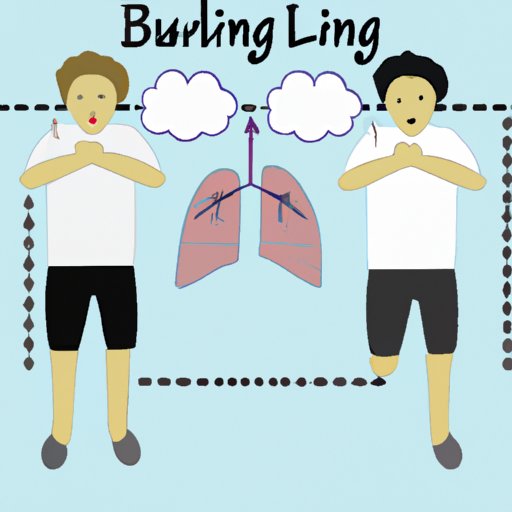Introduction
Your lungs are an essential part of your body and play a vital role in keeping you healthy. They allow you to breathe in oxygen and exhale carbon dioxide, and they also help remove toxins from the air you breathe. Therefore, it is important to take steps to ensure your lungs remain healthy and strong. In this article, we will explore how to improve lung health with tips on quitting smoking, exercising regularly, eating a healthy diet, avoiding pollution, getting vaccinated, and practicing deep breathing exercises.
Quitting Smoking
Smoking is one of the most damaging things you can do to your lungs. The chemicals in cigarettes damage the cells in your lungs, making it harder for them to function properly. Quitting smoking is one of the best ways to improve your lung health. There are many benefits to quitting, including improved breathing, reduced risk of lung cancer, decreased risk of heart attack and stroke, and improved overall health.
If you are trying to quit smoking, there are several things you can do to make the process easier. First, talk to your doctor about medications or other treatments that can help you quit. It can also be helpful to join a support group or talk to a counselor who specializes in helping people quit smoking. Finally, create a plan that includes rewards for reaching certain goals, such as going a week or two without smoking. With dedication and support, you can successfully quit smoking and improve your lung health.
Exercising Regularly
Regular physical activity is another great way to improve your lung health. Exercise helps strengthen your lungs by increasing your breathing capacity, which makes it easier for your lungs to deliver oxygen to your body’s cells. Any type of aerobic exercise, such as running, cycling, swimming, or walking, can help improve your lung health. It is recommended that adults get at least 150 minutes of moderate-intensity physical activity each week.
In addition to aerobic exercise, there are also specific exercises that target the lungs and can help improve their strength and endurance. These include deep breathing exercises and pursed lip breathing. When performing these exercises, it is important to focus on breathing slowly and deeply. This will help your lungs become stronger and more efficient.
Eating a Healthy Diet
A healthy diet is also important for maintaining good lung health. Eating a balanced diet that is rich in fruits, vegetables, whole grains, and lean proteins can help boost your immune system and protect your lungs from irritants and infections. Additionally, some foods are known to have specific benefits for the lungs. For example, omega-3 fatty acids, found in salmon and other fatty fish, can help reduce inflammation in the lungs and improve breathing. Other foods that may benefit the lungs include garlic, green tea, ginger, and turmeric.
It is also important to avoid unhealthy foods, such as processed meats, fried foods, and sugary drinks. These types of foods can increase inflammation and worsen lung conditions. Additionally, if you suffer from asthma, allergies, or other respiratory conditions, it is important to avoid certain foods that can trigger symptoms, such as dairy, eggs, wheat, and nuts.
Avoiding Pollution
Air pollution is a major contributor to poor lung health. Inhaling polluted air can cause irritation and inflammation in the lungs and increase the risk of developing respiratory diseases, such as asthma and COPD. To reduce your exposure to air pollution, it is important to stay indoors when the air quality is poor and avoid activities that generate air pollution, such as burning wood or driving in traffic.
It is also important to use air purifiers in your home and office to reduce the amount of pollutants in the air. Additionally, wearing a face mask when outdoors can help protect your lungs from pollution. Finally, if you live in an area with high levels of air pollution, it is important to check the air quality index regularly so you can plan your outdoor activities accordingly.
Getting Vaccinated
Getting vaccinated is another important step to take for improving your lung health. Vaccines can help protect you from illnesses, such as the flu and pneumonia, which can cause serious complications for people with weakened lungs. There are a variety of vaccines available, such as the seasonal flu vaccine, pneumococcal vaccine, and shingles vaccine. Talk to your doctor about which vaccinations are right for you.
Practicing Deep Breathing Exercises
Deep breathing exercises can help strengthen your lungs and improve your breathing. These exercises involve inhaling deeply and slowly, then exhaling slowly and completely. Practicing these exercises regularly can help increase your lung capacity and reduce stress, anxiety, and fatigue. Additionally, deep breathing exercises can help reduce symptoms of asthma and other respiratory conditions.
When practicing deep breathing exercises, it is important to focus on your breath and try to relax your body. You can also practice visualization techniques, such as imagining yourself in a peaceful place. Additionally, it can be helpful to use a timer to ensure you are taking slow, deep breaths. With regular practice, deep breathing exercises can help improve your lung health.
Conclusion
In conclusion, there are many steps you can take to improve your lung health. Quitting smoking, exercising regularly, eating a healthy diet, avoiding pollution, getting vaccinated, and practicing deep breathing exercises are all effective strategies for improving your lung health. By taking these steps, you can help keep your lungs strong and healthy for years to come.
Taking care of your lungs is an important part of maintaining your overall health.
(Note: Is this article not meeting your expectations? Do you have knowledge or insights to share? Unlock new opportunities and expand your reach by joining our authors team. Click Registration to join us and share your expertise with our readers.)
